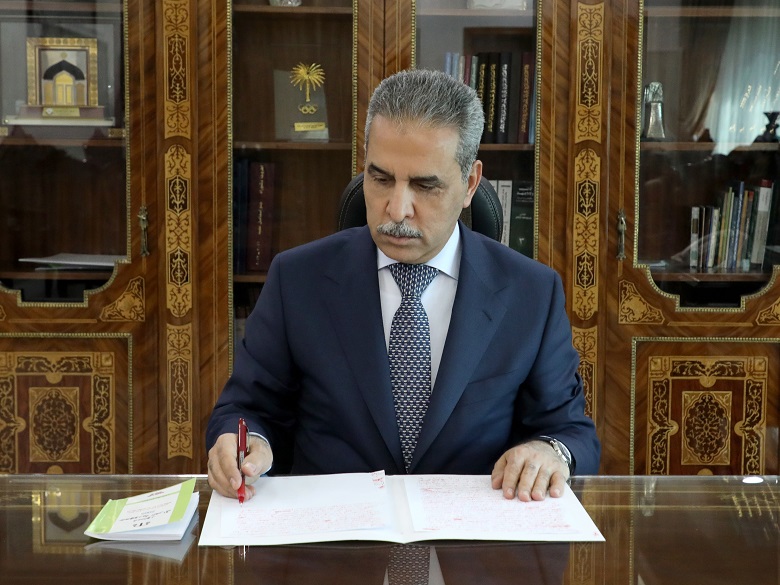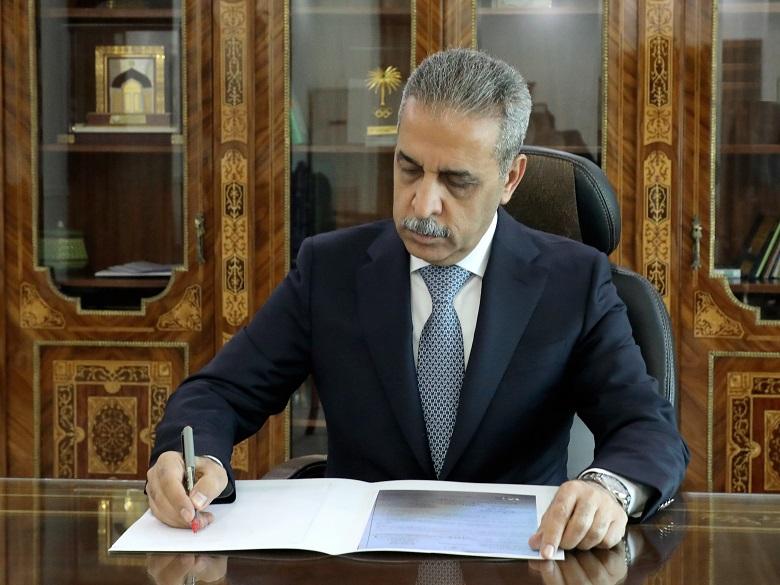
Comment on the decision of the Federal Supreme Court (159/Federal/2021) on 27 December 2021, which includes the response to the appeal to annul the results of the 2021 parliamentary elections
Dr. Ahmed Talal Abdul Hamid Al-Badri
The Federal Supreme Court, on 27 December 2021, issued its decision which related to calling for the cancellation of the parliamentary elections held on 10/10/2021 against the President of the Independent High Electoral Commission (being in this capacity) for violating articles (19.14.5) of the Constitution of the Republic of Iraq for 2005, based on their appeal to a technical report issued by the German examiner company Hensoldt which contracted with by the defendant (being in this capacity) based on an article (38/3rd) of the Council of Representatives Law numbered (9) of 2020 to examine the software of the voting devices (results acceleration devices and attached organs) to enhance the integrity of the electoral process, as the plaintiffs requested a custodian order to stop the procedures for ratifying the final results of the elections until the case is resolved based on article (151) of the Civil Procedure Law No. (83) of 1969 amended, on its aforementioned decision, the Court affirmed very important constitutional principles, including the principle of democracy, the people are the source and legitimacy of the powers, the principle of direct general suffrage through the constitutional institutions, the peaceful transfer of power, the freedom, fairness and integrity of elections, the right to participate in political life, and the principle of separation of powers, although the court's decision to dismiss the case is correct in terms of the result, but we can make some observations on it, and this is what we will address in the following points:
- The Federal Supreme Court is not competent to hear the subject matter of the case, as article (93) of the Constitution of the Republic of Iraq for 2005 specified the exclusive jurisdictions of the Federal Supreme Court, including its jurisdiction under paragraph (7th), which is (the ratification of the final results of the general elections for the membership of the Council of Representatives). This is also the provision of article (4/7th) of the Federal Supreme Court Law No. (30) of 2005 amended by Law No. (25) of 2021, where the paragraph referred to the jurisdiction of the Court in ( Ratification of the final results of the general elections for its members of the Council of Representatives), Article (52/2nd) of the Constitution also included the jurisdiction of the Federal Supreme Court to hear appeals against the decisions of the Council of Representatives to determine the validity of its members, which are issued within (30) days of the date of registration of the objection by a majority of two-thirds of its members, which means that the jurisdictions of the Federal Supreme Court after the holding of the general parliamentary elections are limited to the approval of the results of the general parliamentary elections and then when the Council regularly hears appeals concerning the validity of the membership of members, the court's jurisdiction did not include jurisdiction over electoral appeals, as the legislator was given jurisdiction to decide electoral complaints and appeals to the Board of Commissioners under section (10/5th) of the Independent High Commission for Elections Law No. 31 of 2019, which stipulated that (the determination of electoral complaints and appeals, all of its decisions are subject to appeal to the Judicial Electoral Commission), where the decisions of the Board of Commissioners for the Electoral Process are subject to the supervision of a specialized judicial body formed by the Supreme Judicial Council of the Judiciary. For this purpose, this is stipulated in article (19) of the aforementioned Law, whose decisions shall be the same as the degree of decisions based on an article (105) of the Evidence Law No. (107) of 1979 amended, and therefore may not be challenged before any other party, such as the Federal Court of Cassation or the Federal Supreme Court, and accept any evidence contrary to the authority of the lost provisions based on an article (106) of the aforementioned Evidence Law.
- The rules of non-jurisdiction are considered to be a public order, and as a result, the court must not violate these rules, and the court itself must rule that the jurisdiction is not upheld even if the litigants do not uphold it, and the argument may be made in any case where the case (Mim 77) has arguments and since the Federal Supreme Court is fully aware of its exclusive jurisdiction under article (93) of the Constitution, and since the defendant has argued that there is no jurisdiction under its answering regulations Contained in the court under the letter of the High Commissioner for Elections numbered (Kha/1710/21 on 29/11/2021) the first paragraph of it, it should not prolong the dispute and expressly rule that it has no jurisdiction of trying the electoral appeals, and the Federal Supreme Court has case law, including its numbered decision (17/Federal /2014) on 24 June 2014, in which it ruled that the Federal Supreme Court had no jurisdiction to consider the validity of the vote on the election of the President and two deputies of the Provincial Council And its numbered decision (4/federal/2014) on 4 May 2014 in which it ruled that it had no jurisdiction to consider the annulment of court decisions, as well as its numbered decision (85/federal/2018) on 27 June 2018 The court does not have jurisdiction in the consideration of the case of allocating an electoral seat to the Faili Kurds in Wasit province because the determination of disputes between candidates is the jurisdiction of the electoral administration based on article (8) of the Independent High Commission for Elections Law No. (11) of 2007 and the decisions of the electoral administration are subject to appeal to (the Electoral Judiciary) formed in the Federal Court of Cassation, It also decided not to have jurisdiction to stop the ratification of the elections held on 12 May 2018 for reasons related to its falsification or electoral breaches as it is the responsibility of the High Commission For the elections. Its decision is subject to appeal to the Judicial Electoral Commission of the Federal Court of Cassation, as well as its decision (173/Federal/2018) on 21/11/2018 in which the plaintiff's suit containing the appeal against the decision of the Board of Commissioners to announce the results of the elections and not to endorse the victory of a candidate as it falls outside the jurisdiction of the Federal Supreme Court.
- In its decision, the Court resorted to discussing the appeal in detail and indicated that it had no jurisdiction in paragraph (12) of the decision in response to the plaintiffs' request to present the report of the German examiner company hensoldt to experts to assess what it said, without explicitly stating its lack of jurisdiction in the paragraph of the judgement (the term of the judgement) in which it ruled that the case should be dismissed and should have been mentioned in this paragraph not only in the reasoning of the judgement since under the paragraph of the judgement the dispute is adjudicated and the opponent receives the deduction. The judge should have been clear and unequivocal, as the court was supposed to stay away from going into the details of the appeal as long as it was not competent and merely to establish its decision not to have jurisdiction (159 pleadings) by explaining the defects, reasons and legal bond. A good judgment, as the French judge Ranson says, has three qualities (decisive, clear, brief).
- In paragraph (13) of the ruling, the court called on the next Council of Representatives to amend the Council of Representatives Elections Law No. (9) for 2020 and adopt the system of counting and manual counting instead of electronic, where it stated the reasons for its decision ( ... This court finds that there must be legislative intervention by the next Council of Representatives to amend the Council of Representatives Elections Law No. 9 of 2020 and adopt the system of counting and manual counting instead of counting and electronic counting, as the success of the elections and the consolidation of the principles of democracy through it depends on the confidence of the voter in its credibility and integrity and other objectors based their objections on the results of the elections the incorrectness of some of the procedures carried out by the Independent High Commission for Elections and this calls for the realization of full independence in terms of its organizational structure and the establishment of an electoral system that will gain the confidence of all by legislating the laws that are obligatory for it ...), in fact, the adoption of the electronic counting and counting mechanism is a legislative option that falls within the discretion of the legislator as a representative of the public will and not a legislative failure or omission until the legislator is instructed to avoid it, and this mechanism has not proved to be effective because the appeals relating to counting and electronic counting considered by the competent body for the consideration of electoral appeals did not indicate this, and the legislator adopted this mechanism to ensure the integrity of the electoral process as stated by law, as well as The subject of the case is not related to the unconstitutionality of the Council Elections Law No. (9) of 2020, which was the subject of the court's consideration of an earlier case, namely the numbered (144/federal/2021) Law of 14/11/2021 and the court could directly control the response to unconstitutional texts and paragraphs in it when challenging its unconstitutionality and then instructing for subsequent legislative intervention, This paragraph can also not be counted as a guideline because the decisions of the Federal Supreme Court are strict and binding, and it is also an implicit acknowledgement by the court of not accurately the results of the elections, the results of which were ratified by its numbered decision (175/federal/2021) on 27 December 2021 ... God grants all goodness.




